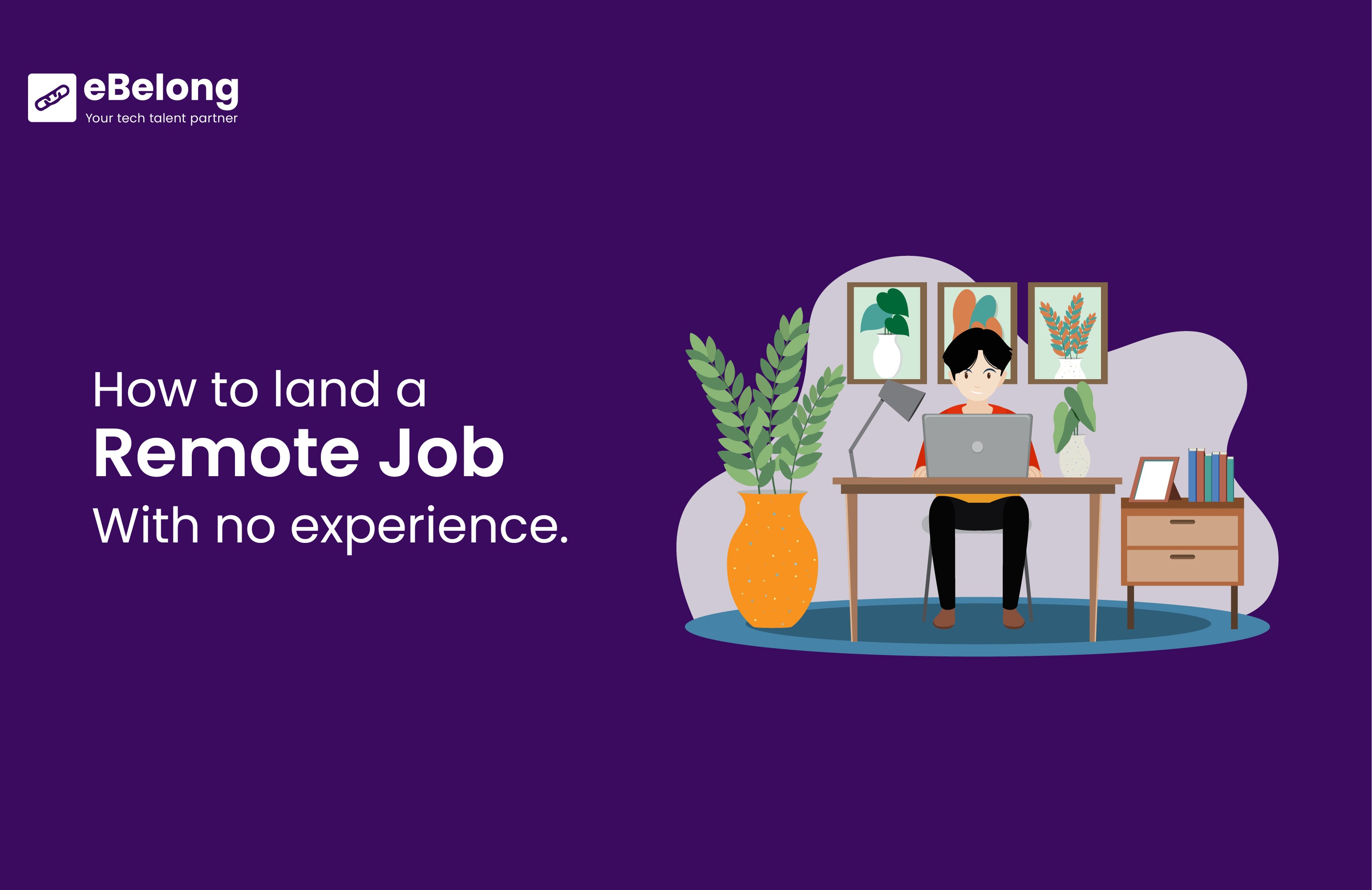How To Land a Remote Job With No Prior Work Experience
What is the trick to getting a remote job even when you don't have the necessary experience? Even if you're new to remote work, we'll show you how to position yourself as a top candidate with 5 simple steps.
Can a person with no prior experience get a remote job?
Some people have been working remotely for years, while others only put their toes in the water in 2020.
As a result, if you're seeking remote work, your lack of expertise may be demotivating given their extensive telecommuting backgrounds.
After reading a job advertisement for your ideal employment, you could become quite enthusiastic, only to become extremely disappointed when you realise you might not even be eligible to apply.
Fortunately, as you'll see in this brief guide, all hope is not lost.
We'll demonstrate how to make yourself stand out from the competition and what it takes to get a remote job with little to no experience.
The Ultimate Guide for Finding Remote Jobs with No Experience
If you follow these five methods, you'll be able to fill in the gaps in your remote work history, skills, and accomplishments while still impressing hiring managers:
Step 1: Determine the experience you do have and what you lack.
Reading remote job postings with a wall of necessary skills, credentials, and experience might be a little scary.
It's crucial to keep in mind that hiring managers describe all those qualities as ideals rather than the end-all and be-all before those emotions of inadequacy start to set in.
The majority of employers are aware that few qualified individuals will have all of those talents. They are trying to hire people who fit as many criteria or come closest to their ideal.
So, if you're lacking a few of these "must-haves," don't be dismayed.
Instead, focus on identifying the range of skills you actually possess and emphasising them to hiring managers. If you impress them enough, what you're missing might not seem like such a big problem.
Therefore, print down the job description and highlight all the talents you do have before applying to any remote opportunities. Then, consider:
- What abilities do I lack?
- Do I possess the necessary talents, but in a different field?
- Can I quickly pick up the remote skills they’re looking for
Your lack of virtual employment can be overcome if you are new to the remote environment but otherwise have the necessary education, experience, and credentials (more on this later!).
Write down whatever experience you have that is pertinent to the position for the time being, then go on to the next.
Step 2: Connect It To Your Experience Right Now
To close the gap between your experience and the qualities the firm is seeking in a job prospect is the aim of this phase.
The easiest approach to do this is to demonstrate how your past and present companies have benefited from your work rather than just telling hiring teams that you have the necessary abilities.
This implies that rather of highlighting a general accomplishment like "managed a team," highlight specific accomplishments like "led a team of 10 to boost B2B sales by 40% in 2020."
This gives potential employers a taste of your abilities and what you might contribute if you are hired.
These impressive, significant stats might be sufficient to make up for your lack of action in the distant world, especially since abilities like these are easily transferable there.
Move on to the skills they're searching for that you don't have once you've created statements like this for the skills and certifications you highlighted in step one.
Check to see if you can begin to obtain these as you submit your application.
When you receive a call for a job interview, you can then talk about how you've honed these skills rather than keeping quiet about them.
Step 3: Begin acquainting yourself with remote tools
Does the job posting particularly need knowledge of using remote tools?
While 100% remote businesses employ a variety of virtual technologies, the most can be divided into two groups: project management tools and communication apps.
Teams at entirely remote companies require a mechanism to communicate as they don't work internally. This is a piece of cake thanks to communication tools like Slack, Skype, Zoom, and other messaging apps.
Learn how to use these effective communication strategies. When it's time for your interview, you'll have experience utilising them or at the very least know what they do.
Additionally, you want to familiarise yourself with project management software such as Trello, Asana, Basecamp, Monday, etc. You don't have to be an expert in all of them, but you should at least be aware of how they operate.
With cloud-based software like this, you can manage your job assignments from a distance while optimising workflows, integrating teams, and keeping track of deadlines in one place.
Having experience in these tools is a major advantage because you'll be in charge of using them and performing the tasks on the list.
Gaining a general awareness of the tools the organisation utilises will help you stand out from the competition if you lack familiarity with them specifically. Additionally, it demonstrates your eagerness to learn new software.
Step 4: Work on the Essential Skills You'll Need
If you see a skill that is frequently required in job postings but you lack it, you may want to go to work on learning it right away.
Even if you are unable to fully master this talent before your interview, working toward it will still demonstrate to employers that you are eager to put up the effort necessary to improve your skill set.
It will also be simpler for you to start working right away once you're employed if you learn even a little portion of the necessary expertise. Since you won't need to start from scratch, which is a little challenging when you're distant but not impossible, you won't have to.
Your efforts will eventually pay off when you can list these talents on your CV for the next position, even if you don't obtain this one. You'll then be one step closer to emerging as a strong job candidate that hiring managers want to snag.
Step 5: Present Your Case
The final stage is to make sure you highlight your best qualities and take all necessary steps to make your application stand out.
Start by doing some keyword research. Take note of all the sector-specific keywords that were used in the job description, and make sure to pepper them throughout your job search materials. These will make it easier for application tracking systems to recognise your resume and forward it to the next round.
Next, spend some time perfecting your cover letter and résumé. Pay close attention to the specifics that align your experience (what you discovered in step two) with what the employer needs (what is stated in the job post). This increases the likelihood that your application will stand out and check off as many boxes as possible.
You might also want to think about developing a personal website or online portfolio to highlight your credentials and skills. Here, you can showcase your strongest points to entice remote businesses to cooperate with you despite any weaknesses you might have.
A current portfolio or website also shows remote employers that you are tech-savvy and can likely work successfully from home as a result, which is a great quality to assist demonstrate your value.
Final Thoughts
If you follow these five steps, even if you don't have all the necessary experience, you'll have a lot better chance of getting that desired remote job.
Never make up or fabricate experience or skills that you don't have. Instead, you should aim to demonstrate how your professional experience may benefit the organisation. Next, make a commitment to developing the talents you are lacking as soon as possible.
It's beneficial to familiarise yourself with the operation of the most often used remote tools. Later, your learning curve will be less steep, and prospective employers will be able to tell that you'll be productive quickly after starting work.
If you follow all of these steps, finding remote work that you enjoy as your next career move won't take long.


